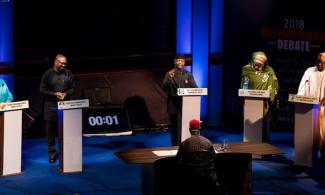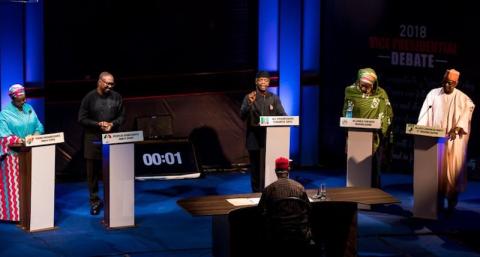
When it came to the question of economic policies, to which Nigeria's current Vice President Yemi Osinbajo had stressed the need to prioritise the fight against corruption, Obi responded, saying: "Fighting corruption is not an economic policy. It is not that you can't fight corruption, but you can fight it aggressively while addressing economic issues".

It was a parade of different policies aimed at improving Nigeria's economy at the vice presidential debate held on Friday night at Transcorp Hilton Hotel in Abuja.
Five political parties were represented: All Progressives Congress (APC), Peoples Democratic Party (PDP), Alliance for New Nigeria (ANN), Allied Congress Party of Nigeria (ACPN) and Young Progressives Party (YPP).
The debate kicked off at 7pm and lasted for more than two hours, with candidates responding to questions on oil subsidy, fighting corruption, improving economic investment, among other issues.
When it came to the question of economic policies, to which Nigeria's current Vice President Yemi Osinbajo had stressed the need to prioritise the fight against corruption, Obi responded, saying: "Fighting corruption is not an economic policy. It is not that you can't fight corruption, but you can fight it aggressively while addressing economic issues".
Obi went on to claim that in 2015, unemployment stood at 24 per cent, but "today, it's at 40 per cent". He also said Nigeria was attracting $21billion in Foreign Direct Investment, but "we attracted only $12billion last year".
The PDP vice presidential candidate also spoke on GDP differences as well as losses in the stock market, stating that: "You can't shut down your shop and be chasing criminals", to which Osinbajo responded "if you allow criminals to steal all the inventory in the shop, there will be no shop. That's the problem".
Obi also spoke against subsidising oil, stating that "what we are subsidising today is inefficiency and if you get it right the prices will come down. There is no way a country can have a budget of N340billion for health which translates to N5 a day for each of its citizens and then pay one trillion Naira for subsidy”.
Noting that payment of subsidy was not peculiar to Nigeria, Osinbajo stressed the need to retain payment of subsidy, stating that: "The NNPC is the sole importer of petroleum. So, it is from the balance sheet of the NNPC that the subsidy is taken. Now, let me say that if today, you are to remove subsidy, petrol price could go as high as N220 per litre or higher".
He also restated the need to focus on infrastructure, power and investment.
Umar Getso, the YPP vice presidential candidate, noted that her party would focus on economic restructuring, which will target improved standard of living through creation of jobs, among others.
Ganiyu Galadima, the ACPN vice presidential candidate, spoke on his party's plans to improve the economy, which he said would be achieved through creating friendly business environment for investors, prioritising privatisation, as well as promoting people-friendly policies.
Khadija Abdulahi-Iya, the ANN vice presidential candidate, stressed the need for constitutional restructuring through devolution of power, stating that "those are the structures that affect the endemic poverty that we have in Nigeria".